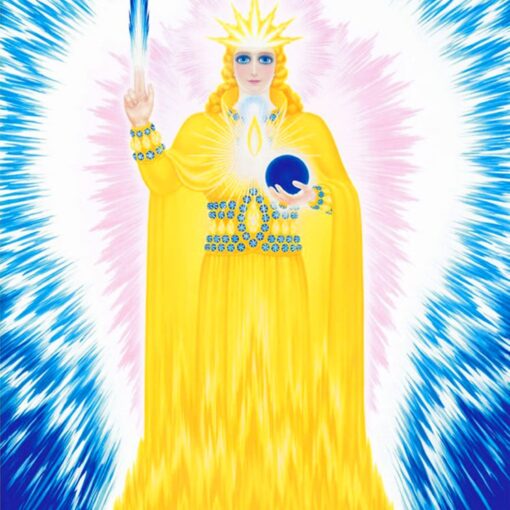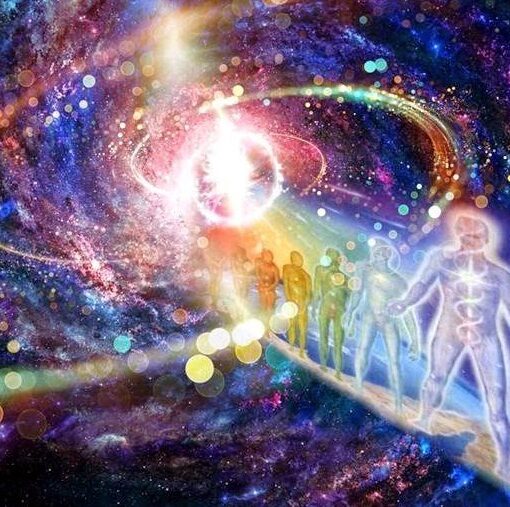
DEATH: THE ART OF DYING
死亡:死亡的艺术
The problem of death or the art of dying. This is something which all seriously ill people must inevitably face, and for which those in good health should prepare themselves, through correct thinking and sane anticipation. The morbid attitude of the majority of men to the subject of death, and their refusal to consider it when in good health, is something which must be altered and deliberately changed. Christ demonstrated to His disciples the correct attitude, when referring to His coming and immediate decease at the hand of His enemies; He chided them when they evidenced sorrow, reminding them that He was, occultly speaking, “making restitution to the Monad”; ordinary people, and those below the grade of an initiate of the third degree, make “restitution to the soul”. The fear and the morbidness which the subject of death usually evokes, and the unwillingness to face it with understanding, are due to the emphasis which people lay upon the fact of the physical body, and the facility with which they identify themselves with it; it is based also upon an innate fear of loneliness, and the loss of the familiar. Yet the loneliness which eventuates after death, when the man finds himself without a physical vehicle, is as nothing compared to the loneliness of birth. At birth, the soul finds itself in new surroundings, and immersed in a body which is at first totally incompetent to take care of itself, or to establish intelligent contact with surrounding conditions for a long period of time. The man comes into incarnation with no recollection as to the identity or the significance to him of the group of souls in bodies with which he finds himself in relationship; this loneliness only disappears gradually as he makes his own personality contacts, discovers those who are congenial to him, and eventually gathers around him those whom he calls his friends. After death this is not so, for the man finds on the other side of the veil those whom he knows, and who have been connected with him in physical plane life, and he is never alone as human beings understand loneliness; he is also conscious of those still in physical bodies; he can see them, he can tune in on their emotions, and also upon their thinking, for the physical brain, being non-existent, no longer acts as a deterrent. If people [Page 69] but knew more, birth would be the experience which they would dread, and not death, for birth establishes the soul in the true prison, and physical death is only the first step towards liberation. (17 – 391/3).
死亡的问题,或者说死亡的艺术。这是所有重病患者都不可避免要面对的问题,也是身体健康的人应该通过正确的思考和理智的预期做好准备的事情。大多数人对死亡这个话题的病态态度,以及他们在身体健康时拒绝去考虑这一点,这样的态度必须要转变,而且是有意识地转变。当涉及到基督的降临和他将即刻死于他敌人的手中时,基督向他的弟子展示出了正确的态度;当弟子们表现出悲伤时,他责备他们,提醒他们,从秘法学角度讲,他是在“回归至单子”;普通人,以及那些三阶启蒙以下的启蒙者,则是“回归至灵魂”。死亡这个话题常常会引起恐惧和病态的回应,并且不愿意以理解的方式去面对它,这是因为人们把中心放在物质身体上这一事实,而且人们很容易把自己认同为肉身;它也基于内在对孤独的恐惧和对失去熟悉事物的忧虑。然而,当人们发现他在没有物质载具的情况下,最终死亡后产生的恐惧感与出生时的恐惧感相比,简直微不足道。出生时,灵魂发现自己处于新的环境中,并身处一具在最初完全无法照顾自己的身体中,也无法长时间与周围的环境建立智力上的连结。转世的人不记得自己的身份,也不记得与处于身体之中的其他灵魂团体对自己的重要性,他忘记了自己在这个灵魂团体中的关系;这种孤独感只有在他建立自己人格层面的连结时才会逐渐消失,他会发现那些与他志趣相同的人,并最终聚集在他身边的人,他把他们称之为朋友。死亡之后的情况并非如此,因为他会在帷幕的另一侧找到他认识的人,以及在物质层面生活中与他有连结的人,而他永远不会像人类理解的孤单那样再感到孤单了;他也意识到那些仍然身处物质身体中的人;他可以看到他们,可以了解他们的情绪,也可以知晓他们的想法,因为物质大脑不存在,不再作为阻碍物。如果人们知道得更多,出生将会成为他们害怕的体验,而非死亡,因为出生是把灵魂置于真正的监狱中,肉身的死亡只是通往自由的第一步。
https://www.lucistrust.org/books/ponder_on_this/ponder_online/contents



